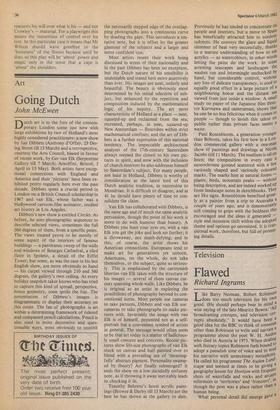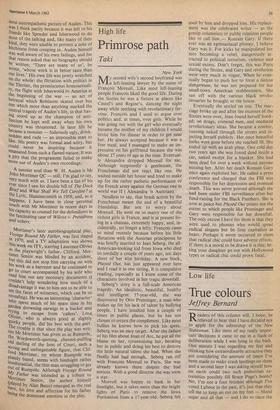Television
Flawed
Richard Ingrams
Like Barry Norman, Robert Robinson does too much television for his own good. (He should perhaps bear in mind „a wise saying of the late Maurice Bowra: 'Au broadcasting corrupts, and television cor- rupts absolutely.' It would have been a good idea for the BBC to think of someone other than Robinson to write and narrate a programme about the poet W. H. Auden who died in Austria in 1973. When dealing with literary topics Robinson feels bound t°, adopt a pseudish tone of voice and to stile' his narrative with unnecessary metaphors. He called his programme The Auden Land- scape and seemed at times to be giving a geography lesson for Horizon with frequent shots of waterfalls and rocks and arcane references to 'territories' and 'frontiers', as though the poet was a place rather than a human being.
What personal detail did emerge gave a
most unsympathetic picture of Auden. This was I think partly because it was left to his friends like Spender and Isherwood to do most of the talking and, like many of their kind, they were unable to prevent a note of bitchiness from creeping in. Auden himself was well aware of his own failings, and for that reason asked that no biography should be written; 'There are many of us', he wrote, 'whose work is in better taste than our lives.' His own life was pretty wretched on the whole: the flirtation with politics in the Thirties, the promiscuous homosexuali- ty, the flight with Isherwood to America at the beginning of the war — an act of betrayal which Robinson skated over but one which more than anything marked the Central tragedy of Auden's life, in that hav- ing stood up as the champion of anti- fascism he kept well away when his own country was threatened. In later life he became a monster — hideously ugly, drink- sodden and rude — an impossible man to like. His poetry was formal and witty, but could never be inspiring because it emanated from such a flawed nature. It was a pity that the programme failed to make more use of Auden's own recordings.
A sunnier soul than W. H. Auden is Mr John Mortimer QC — still, I'm glad to say, very much with us. I have been a fan of his ever since I saw his double bill of The Dock Brief and What Shall We Tell Caroline? at the Lyric, Hammersmith in 1958; and, as it happens, I have been in close personal touch with Mr Mortimer in recent days in his capacity as counsel for the defendants in the fascinating case of Wilcox v. Pressdram and others.
Mortimer's later autobiographical play, Voyage Round My Father, was first staged to 1970, and a TV adaptation was shown this week on ITV, starring Laurence Olivier as the playwright's father, Clifford. Mor- timer Senior was blinded by an accident, but this did not stop him carrying on with his work as a barrister and he continued to go to court accompanied by his wife who read him out any necessary documents (I couldn't help wondering how much of a disadvantage it was to him not to be able to see the faces of witnesses, which can be so revealing). He was an interesting 'character' who spent much of his spare time in his garden drowning earwigs in a bucket and trying
to escape from 'callers'. Lord Olivier, who is always good at slightly quirky people, did his best with the part.
The trouble is that since the play was writ- ten Mr Mortimer has given us in Rumpole, the Wordsworth-quoting, cheroot-puffing old darling of the Inns of Court, such a strong and unforgettable figure, that Clif- ford Mortimer, on whom Rumpole was Plainly based, seems with hindsight rather insubstantial, the thin man struggling to get out of Rumpole. Although Voyage Round My Father was intended as a tribute to ,Mortimer Senior, the author himself ‘,Played by Alan Bates) emerged as the real ,ne!.0, his love and affection for his father being the dominant emotion in the play.







































 Previous page
Previous page